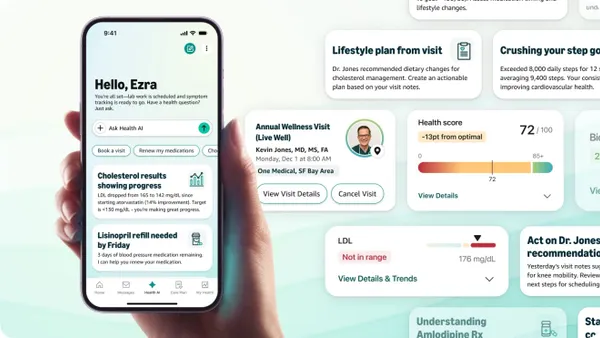Dive Brief:
- The third iteration of FDA's vision for its Software Pre-Certification Program garnered tempered support from industry groups AdvaMed and the Medical Imaging & Technology Alliance in comments posted Monday. The question of statutory authority still looms, with AdvaMed arguing the program's promise “may not be fully realized without legislative authorization.”
- The American Medical Association raised concern in its comment that certain artificial intelligence and machine learning products pose unique risks and should not be allowed into the program until further changes are made.
- FDA has said it remains on track to formally launch a Pre-Cert pilot program this year under its current statutory authority.
Dive Insight:
The Pre-Cert program aims to make it easier for companies to develop and patch software as a medical device by pre-clearing select companies to push software to market with little agency review.
The latest working model, released in January, outlined an FDA plan to use the De Novo pathway in concert with streamlined review during the pilot phase, where the agency hopes to evaluate if pre-clearance for firms is comparable to a traditional marketing submission.
Agency officials including Commissioner Scott Gottlieb have said the agency is still planning to test the pilot program in 2019. Nine companies, including Fitbit, Pear Therapeutics and Apple are taking part.
In its comment, AdvaMed laid out a list of tweaks it wants to see before the program is finalized including a risk-based approach to evaluating pre-cleared firms' key performance indicators “to maintain a consistence level of excellence,” adapting the International Medical Device Regulators Forum risk categorization framework to the U.S. market and the establishment of a five day timeline for review when FDA receives a confirmation document.
The device lobby also repeated a request that FDA open Pre-Cert to software in a medical device, not just software as a medical device.
AdvaMed member GE Healthcare argued the program's “no review” pathway exempting certain SaMD from a 510(k) cannot be utilized during the initial program without congressional action.
“In the latest iteration of the Working Model it is not clear whether trusted Pre‐Certified organizations will have the ability to place software medical devices on the market faster than today's regulatory model allows,” wrote Camille Vidal, GE Healthcare regulatory affairs director of digital health.
Brad Thompson, a lawyer for software companies, told MedTech Dive in an interview that while he did not submit new comments to the docket, his concerns about the utility of the program for smaller companies in the latest working model remain.
“I think right now, unfortunately, the deck is stacked toward larger established companies and the program really doesn't help startups,” Thompson said. “That's a shame because the startups are the source of a lot of innovation. I'd love to see Pre-Cert Program modified to make it more attractive to these startups.”
At the same time, AMA's feedback suggests doctors may not trust products cleared through the expedited pathway if FDA gives smaller companies more leniency.
“We reiterate our previous concerns about the [Pre-Cert Program] elements that would undermine FDA efforts to promote the [Pre-Cert Program] as an excellence model and erode physician trust that products developed through this pathway are safe and efficacious,” AMA CEO James Madara wrote.
Some Democrats in Congress have also expressed worry that the agency is moving toward a too-lenient approach, compromising safety.












